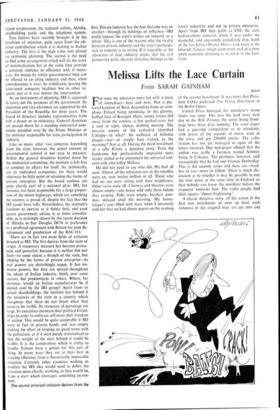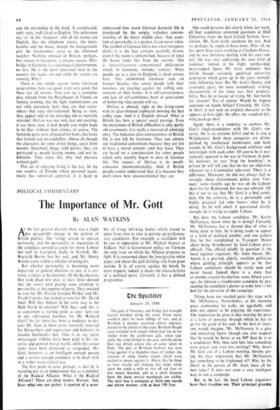Melissa Lifts the Lace Curtain
From SARAH GAINHAM
BONN
FOR once the television news led with a piece of immediacy—here and now. Not a pic- torial handout of Rusk descending from an aero- plane, Erhard being optimistic, or the gloomy, baffled face of Kosygin. Dark, snowy streets slid away from the camera, a few parked cars, not a soul in sight, silence, nothing moving. The massive towers of the cathedral identified Cologne—in what? An outbreak of bubonic plague—war--or simply four o'clock in the morning? Not at all. During the third instalment of a telly Krimi, a detective story. Even the handsome but professionally impassive news reader smiled as he announced the universal con- cern with who killed Melissa.
He did not need to say who did. We had all seen. Almost all the television sets in the republic were on, over twelve million in all. Those who had no sets were sitting with their neighbours. Other visits were off. Cinemas and theatres were almost empty—one house sold only three tickets that evening. Pubs were empty, business jour- neys delayed until the morning. My house- keeper's eyes filled with tears when I nervously told her that we had dinner guests on the evening
of the second instalment. It was news that Presi- dent Liibke preferred The Flying Dutchman at the Berlin Opera.
United Press betrayed the murderer's name hours too soon. This was the lead story next day in the Bild Zeitung, the series being front- page news three days running. The same paper had a guessing competition as to whodunit, with prizes of the records of music used in the story, and got 230,000 entries. The radio station has not yet managed to open all the letters received. One newspaper alleged that the author was really a German named Schmitz living in Cologne. The producer, however, said reassuringly that he had met Francis Durbridge. This is the seventh series and there are—need- less to say—more to follow. There is much dis- cussion as to whether it may be possible to run the next series at the same time in England so that nobody can know the murderer before the inspector unmasks him. The radio people find their success 'almost frightening.'
A classic detective story, all the action in the first two instalments of over an hour each (whereas in the original they are cut into six) and the unwinding in the third. A complicated, tight story, well faked as English. The policemen say `sir' to the Inspector' and all the names are . English, like the telephone kiosks, the door- handles and the buses, though the backgrounds give the Germanness away to the informed watcher. Nothing unusual in Britain, perhaps, but unique in Germany, a unique success. Dur- bridge in Germany is a sociological phenomenon, no less. He is the most renowned man in the country for weeks on end while his stories are running. Why?
There is one simple reason. Some television programmes here are good, even very good, but these are all serious. You can see a complete play relayed from the Burgtheater in Vienna on Sunday evening, but the light transmissions are not only extremely bad—they are that every- where—but very old-fashioned. Being so slow, they appeal only to the nostalgic old or mentally retarded. Melissa was not only fast and exciting, it was here, now, it had people you might hope to be like—without their crimes, of course. The feminine parts were all picked for looks, but looks that looked real, no candyfloss. Above all, though the characters do some awful things, apart from murder, blackmail, drugs, wild parties, they are portrayed as people having money and not in- hibitions. They enjoy life, they feel pleasure without guilt.
This air of enjoying living is the key. In the one country of Europe where personal eccen- tricity has universal approval, it is hard to understand how much German domestic life is dominated by the empty, valueless conven- tionality of the lower middle class. Any asser- tion of personality is a protest, it can never relax. The symbol of German life is not what foreigners think—it is the lace curtains carefully drawn, even if the room is unfurnished, because of what the house looks like from the outside. This is SpiesAbiirgertunz—conventional philistinism which, in Germany, includes `culture.' What people see as a joke in England, is dead serious here. The uninhibited Germans seen on foreign beaches who annoy people with their noisiness are reacting against the stifling con- ventions of their homes. It is self-consciousness, and lack of self-confidence born of generations of bothering what people will say.
Melissa is abroad, right in the living-room with its glass-fronted cupboard showing the best coffee cups. And it is English abroad. What is British has here a special social prestige. Even the enjoyment of British difficulties is only partly old resentment; it is really a reversal of admiring envy. The ludicrous class-consciousness of British life is not felt by Germans. They can admire our traditional conventions because they are felt to have a moral content—and they have. They are based on a consideration for other people which only recently began to exist in German life. The success of Melissa is its unself- conscious unconventionality. And if British people cannot understand that, it is because they don't know how unconventional they are.



































 Previous page
Previous page